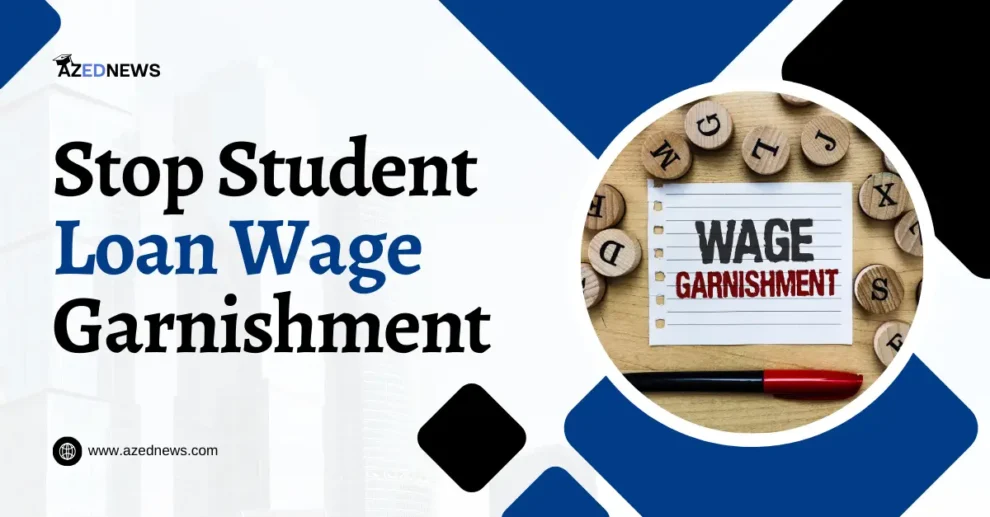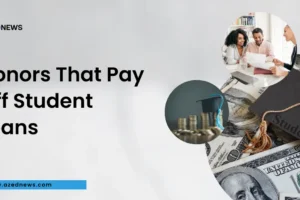Are you looking to Stop Student Loan Wage Garnishment? then you have landed on the right article. Your loan servicer may pursue aggressive collection tactics, such as garnishing your wages or withholding your tax return, if your loans are in default.
Paying the remaining amount in full can help prevent wage garnishment, but this may not be an option if you are having financial difficulties.
Table of Contents
As an alternative, you can seek a consolidation loan or rehabilitate your loan to stop the garnishment of your student loans.
You should carefully consider your alternatives if you’ve gotten a letter informing you that your student loans are in default and threatening wage garnishment, or if your employer has already started to do so.
In this blog, we have decoded all the details, including ways to stop student loan garnishment and more.
Key takeaways:
- There are various ways to stop student loan garnishment.
- Student loan wage garnishment will cause the employer to deduct a certain amount from the employee’s paycheck to clear student loans.
- When students fall behind on their payments by 270 days or more, their debts go into default.
- However, there are less severe penalties for not making loan payments on your federal student loans through September 30, 2024.
- There are various ways to stop student loan garnishment, such as appealing on account of poverty and requesting a hearing.
- To get loans out of default students can pay back their loans or find other financing options.
- Before the loans go into default, they will offer students multiple warnings and notify them when their payments are past due.
What is student loan garnishment?
One of the consequences of defaulting on your student loans is wage garnishment. Your loan servicer may send the account to collections and report the loan status to the main credit bureaus when you go into default, which could negatively affect your credit.
The servicer may be able to collect the money you owe through wage garnishment, depending on the type of loan you have.
Through a legal process known as “student loan wage garnishment,” an employer is compelled to deduct a certain amount from an employee’s paycheck in order to satisfy their student loan debt.
If your wages are garnished by the lender, the garnishment will remain in effect until either you work out of default with the lender or the loan is paid up in full.
Can wages be garnished for student loan repayment?
Yes, and the practice is becoming more and more common. The rate of workers having their wages withheld due to student loan debt doubled, according to the NBER.
But depending on the type of loan you have, there are several steps involved in the procedure before your income can be garnished. The types of loans are:
1. Federal student loans:
You probably have federal debt if you have debt from student loans. Nearly 93% of all outstanding student loan debt is from federal loans. Federal loan defaults typically have dire implications.
When you fall behind on your payments by 270 days or more, your debts go into default. In contrast to other debt, federal loan servicers have the right, in the event of a loan default, to garnish your wages without a judge’s approval.
There are less severe penalties for not making loan payments on your federal student loans through September 30, 2024. No federal loan debtors will experience wage garnishment as a result of this move until at least October 2024.
2. Private student loans:
Just 7% of all student loan debt is owed on private loans, which are less frequent than federal loans.
However, borrowers of private loans should be aware that they fall into default earlier than those of federal loans; in fact, default on a private loan can occur as soon as ninety days after the due date.
But without a court order, private student loan lenders are not allowed to garnish your wages. Before garnishing your earnings, the lender must file a lawsuit and win their case.
How much money can be garnished for student loans?
1. Federal loan wage garnishment maximum:
The maximum wage garnishment amount for federal loans is 15% of your disposable income.
Your disposable income is defined by law as your wages less all legally mandated deductions, including federal, state, local, and Medicare taxes, Social Security, and Medicare.
That computation excludes additional deductions for things like life and health insurance, retirement contributions, and charity giving.
2. Private student loan wage garnishment maximum:
The maximum amount that can be garnished from your paycheck for private loans varies from state to state, but it can be as high as 25% of your total income.
The amount that can be withheld from your paycheck is usually equal to 25% of your gross income or thirty times the federal minimum wage. You are not subject to garnishment if your weekly take-home income is thirty times the federal minimum wage or less.
The federal minimum wage, for instance, is currently $7.25 per hour. Your weekly disposable income must be more than thirty times the minimum wage, under the legislation. Your wages cannot be garnished if your weekly income is less than $217.50.
How can I stop student loan wage garnishment?
You will receive a notification of wage garnishment from the lender or loan servicer if your debts are in default. In that case, take into account these options:
1. Appeal on account of poverty
By contacting your loan servicer and providing supporting paperwork, you may be able to request an end to wage garnishment if you are experiencing a serious financial difficulty, such as an impending house foreclosure.
2. Discuss terms of payment:
Negotiate repayment terms with the loan servicer or collection agency if you receive a wage garnishment notice. You might be able to prevent wage garnishment if you can agree on a new payment schedule.
Students can apply for loan payment refunds to help themselves clear off the loan, which could potentially stop student loan wage garnishment.
3. Request a hearing:
Prior to the wage garnishment taking effect, you are entitled to request a hearing. You have thirty days from the date of your notification to submit a written request for a hearing.
In any of the following circumstances, you could be able to prevent wage garnishment during the hearing or have the amount garnished lowered:
- You feel that the student loan was obtained without your permission or that it does not belong to you.
- You would experience severe financial hardship, such as not being able to pay your rent or mortgage, if 15% of your wages were garnished.
- You were let go of your job and haven’t had a new position for more than a year.
All proceedings pertaining to federal student loans must take place in Atlanta, Chicago, or San Francisco.
Hearings may take place over the phone or in person. All paperwork must be provided by you, and additional costs for legal counsel can apply.
How to get loans out of default?
By getting your loans out of default, you can stop having your wages garnished. To do so, there are four options:
1. Recuperation:
Using a rehabilitation agreement, this strategy entails working with your lender to make a series of consecutive, on-time payments. The loans are no longer in default once the required number of payments have been made.
2. Debt refinancing for students:
Refinancing is an option that lets borrowers of both federal and private student loans pay off their current loans in full and replace them with a new loan with a different conditions.
But, since you’re in default, your credit is probably already harmed, so in order to be eligible for student loan refinancing, you’ll probably need a co-signer. Additionally, you will no longer be eligible for federal protections like income-driven repayment if you refinance federal loans.
3. Payback:
Paying up the loans in full is an additional method of escaping default. Although it would seem unfeasible, some borrowers manage to pull that off by selling possessions, borrowing from family members, or withdrawing money from retirement or emergency funds.
It’s risky to take out cash from your retirement fund or take on more debt, so be sure you’ve tried every other avenue first.
At this time, federal loan borrowers are not eligible for rehabilitation. Borrowers may instead benefit from the Fresh Start program. For borrowers who are in default, Fresh Start is a one-time, temporary program.
It pulls your debts out of default and gives you the option to select a different repayment schedule that can result in lower monthly payments.
Borrowers will once again have access to rehabilitation after the Fresh Start program concludes.
How to avoid wage garnishment?
One can prevent wage garnishment. Usually, creditors use it as a final option. Before your loans go into default, they will offer you multiple warnings and notify you when your payments are past due.
On the other hand, be prepared for your servicer to pursue legal action to recoup their investment if you fail to make your payments.
Take these actions to avoid going into default on your student loans if you’re concerned about having your wages garnished.
1. Make regular, on-time payments:
It can be difficult to keep track of the many minimum payments and due dates if you have multiple student loans. By automating payments or setting up reminders, you can reduce the likelihood that you will forget to make a payment by keeping track of them.
2. Register for a repayment plan based on income:
An income-driven repayment (IDR) plan could help you manage your payments if you are having trouble making them.
The government lengthens the payback period and caps the monthly payment amount under these plans at a portion of your disposable income. Your monthly price might be significantly reduced with an IDR plan.
When your salary is smaller than your amount, an IDR plan might be quite helpful, even though you will probably pay more in interest over the course of your new payback period.
3. Request a forbearance or deferment:
Even though it’s crucial, there may be instances when paying your bills is out of reach. Your student debts might not be your top concern if you’ve lost your job, are experiencing financial difficulties, or are dealing with a medical emergency.
You have the option to speak with your lender and request a payment delay or forbearance rather than allowing your debts to go into default. With the help of this procedure, you can delay payments without going into default as you rebuild your finances.
How to dispute student loan garnishment?
You may be eligible to contest the U.S. Department of Education’s notification that your earnings may be garnished in order to pay down your student loans for the following reasons:
- You would experience “extreme financial hardship” if your wages were garnished.
- Although you have been working for less than a year, you were unemployed for an involuntary period before.
- Within 30 days of learning that your wages will be withheld, you must submit a written request for a hearing in order to contest the garnishment. The hearing will be scheduled by your student loan lender; in the interim, you must obtain evidence to back up your contention.
- You should get a decision following the hearing within sixty days of the day your request was received.
In the event that the ruling is in your favor, the withholding percentage will be lowered, or you may be spared garnishment for the ensuing year.
Should your appeal be rejected, the government will proceed with the 15% wage garnishment.
Frequently Asked Questions:
1. Can student debt be canceled?
For borrowers who commenced repayment a long time ago, cancel student loans. Forgiveness would be granted to borrowers whose undergraduate debt was taken into repayment 20 years or more ago, and to those whose graduate school debt was entered into repayment 25 years or more ago.
2. What is garnishment of student loans?
Wage garnishment related to student loans is one possible legal repercussion of not making loan payments on your federal student loans. When your wages are garnished, the government takes money out of them directly in order to pay back your student loans.
3. How Much of a Federal Loan May I Receive Back in Wages?
Up to 15% of your disposable income may be deducted from your paycheck if you have federal loans. The money that remains in your account after taxes are deducted is your disposable income.
4. Does having your credit score garnished effect you?
In a technical sense, loan default has an impact on your credit score rather than garnishing your wages. Your credit score has already suffered harm if your wages are withheld.
5. How long is it possible to garnish student loans?
The garnishment will not stop until your debt is settled. The unpaid sum on your federal loans is waived after 20 to 25 years if you’re enrolled in an income-driven repayment plan.
Conclusion:
If your loan is in default, one of the repercussions could be wage garnishment. This implies that in order to pay back your defaulted loan, your employer might be obliged to deduct a certain amount from your paycheck and send it to the lender.
In order to collect your defaulted obligation without going to court, your loan holder may compel your employer to withhold up to 15% of your take-home pay. Until your overdue debt is fully repaid or the default situation is rectified, this withholding will remain in place.












Add Comment